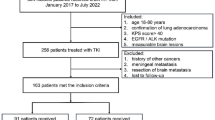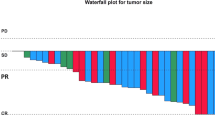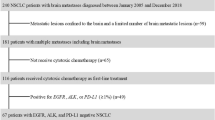Abstract
Purpose
ALK-positive NSCLC patients exhibit a particularly high propensity for the development of brain metastases. Current guidelines suggest transit to next-line therapy (SysTx) or local radiotherapy (RadTx) including whole-brain radiotherapy and radiosurgery. However, the clinical impact of these two strategies remains unclear.
Methods
We conducted a retrospective analysis focusing on patients with stage IV ALK-positive NSCLC who underwent first-line ALK TKI treatment. Patients with intracranial progression may receive two different treatment strategies: SysTx and RadTx. Our objective was to investigate the outcomes associated with these two distinct treatment pathways.
Results
A total 20 patients of ALK-positive NSCLC who received first-line ALK TKI therapy and subsequently developed intracranial progression were enrolled. About 55% of patients had brain metastasis initially. Nine patients (45%) were treated with crizotinib at first. Patients treated with crizotinib demonstrated a significantly shorter intracranial PFS1 (crizotinib: 8.27 months vs. others: 27.0 months, p = 0.006). Following intracranial progression, approximately 60% of patients transitioned to the next line of systemic treatment (SysTx), while the remaining 40% opted for local cranial radiotherapy (RadTx). Intriguingly, our analysis revealed no statistically significant difference in intracranial progression-free survival (PFS2) between these two distinct treatment strategies. (SysTx: 20.87 months vs. RadTx: 28.23 months, p = 0.461).
Conclusion
The intracranial progression-free survival showed no difference between the two strategies suggesting that both local radiotherapy and systemic therapy may be valid options. Individualized strategy, molecular analysis, and multidisciplinary conferences may all play a pivotal role in decision-making.



Similar content being viewed by others
References
Ceddia S, Codacci-Pisanelli G (2021) Treatment of brain metastases in ALK-positive non-small cell lung cancer. Crit Rev Oncol Hematol 165:103400
Peters S, Bexelius C, Munk V, Leighl N (2016) The impact of brain metastasis on quality of life, resource utilization and survival in patients with non-small-cell lung cancer. Cancer Treat Rev 45:139–162
Ettinger DS, Wood DE, Aisner DL, Akerley W, Bauman JR, Bharat A et al (2023) NCCN guidelines insights: non-small cell lung cancer, version 2.2023. J Natl Compr Canc Netw 21(4):340–350
Nelson TA, Wang N (2023) Targeting lung cancer brain metastases: a narrative review of emerging insights for anaplastic Lymphoma kinase (ALK)-positive Disease. Transl Lung Cancer Res 12(2):379–392
Buss EJ, Wang TJC (2018) Treatment of lung adenocarcinoma brain metastases: what is the role of radiotherapy in the age of precision medicine? Transl Lung Cancer Res 7(Suppl 4):S318–S20
Johung KL, Yeh N, Desai NB, Williams TM, Lautenschlaeger T, Arvold ND et al (2016) Extended survival and prognostic factors for patients with ALK-rearranged non-small-cell lung cancer and brain metastasis. J Clin Oncol 34(2):123–129
Dempke WC, Edvardsen K, Lu S, Reinmuth N, Reck M, Inoue A (2015) Brain metastases in NSCLC - are TKIs changing the treatment strategy? Anticancer Res 35(11):5797–5806
Liao HR, Chiang CL, Shen CI, Chen CJ, Yang HC, Wu HM et al (2022) EGFR mutant status and tyrosine-kinase inhibitors affect the GKRS outcomes for NSCLC brain metastases. J Neurooncol 159(3):675–684
Matsunaga S, Shuto T (2021) Outcomes of gamma knife radiosurgery for brain metastases from anaplastic lymphoma kinase rearrangement-positive and EGFR mutation-positive non-small cell lung cancer. Cureus 13(12):e20398
Weber B, Winterdahl M, Memon A, Sorensen BS, Keiding S, Sorensen L et al (2011) Erlotinib accumulation in brain metastases from non-small cell lung cancer: visualization by positron emission tomography in a patient harboring a mutation in the epidermal growth factor receptor. J Thorac Oncol 6(7):1287–1289
Togashi Y, Masago K, Masuda S, Mizuno T, Fukudo M, Ikemi Y et al (2012) Cerebrospinal fluid concentration of gefitinib and erlotinib in patients with non-small cell lung cancer. Cancer Chemother Pharmacol 70(3):399–405
Chen YC, Lee CC, Chiang CL, Yang HC, Wu HM, Chen CJ et al Combined BBB-penetrant tyrosine kinase inhibitor and intracranial radiotherapy versus BBB-penetrant tyrosine kinase inhibitor alone for the treatment of EGFR-mutated non-small cell lung cancer patients with brain metastases. https://doi.org/10.21203/rs.3.rs-2960400/v1
Cho A, Untersteiner H, Hirschmann D, Shaltout A, Gobl P, Dorfer C et al (2020) Gamma knife radiosurgery for brain metastases in non-small cell lung cancer patients treated with immunotherapy or targeted therapy. Cancers (Basel). 12(12)
Vogelbaum MA, Brown PD, Messersmith H, Brastianos PK, Burri S, Cahill D et al (2022) Treatment for brain metastases: ASCO-SNO-ASTRO guideline. J Clin Oncol 40(5):492–516
Thomas NJ, Myall NJ, Sun F, Patil T, Mushtaq R, Yu C et al (2022) Brain metastases in EGFR- and ALK-Positive NSCLC: outcomes of central nervous system-penetrant tyrosine kinase inhibitors alone versus in combination with radiation. J Thorac Oncol 17(1):116–129
Zhang Z, Guo H, Lu Y, Hao W, Han L (2019) Anaplastic lymphoma kinase inhibitors in non-small cell Lung cancer patients with brain metastases: a meta-analysis. J Thorac Dis 11(4):1397–1409
Costa DB, Kobayashi S, Pandya SS, Yeo WL, Shen Z, Tan W et al (2011) CSF concentration of the anaplastic lymphoma kinase inhibitor crizotinib. J Clin Oncol 29(15):e443–e445
Kim DW, Mehra R, Tan DSW, Felip E, Chow LQM, Camidge DR et al (2016) Activity and safety of ceritinib in patients with ALK-rearranged non-small-cell lung cancer (ASCEND-1): updated results from the multicentre, open-label, phase 1 trial. Lancet Oncol 17(4):452–463
Peters S, Camidge DR, Shaw AT, Gadgeel S, Ahn JS, Kim DW et al (2017) Alectinib versus crizotinib in untreated ALK-positive non-small-cell Lung cancer. N Engl J Med 377(9):829–838
Camidge DR, Kim HR, Ahn MJ, Yang JC, Han JY, Lee JS et al (2018) Brigatinib versus crizotinib in ALK-positive non-small-cell Lung cancer. N Engl J Med 379(21):2027–2039
Kodama T, Hasegawa M, Takanashi K, Sakurai Y, Kondoh O, Sakamoto H (2014) Antitumor activity of the selective ALK inhibitor alectinib in models of intracranial metastases. Cancer Chemother Pharmacol 74(5):1023–1028
Shaw AT, Bauer TM, de Marinis F, Felip E, Goto Y, Liu G et al (2020) First-line lorlatinib or crizotinib in advanced ALK-positive lung cancer. N Engl J Med 383(21):2018–2029
Felip E, Shaw AT, Bearz A, Camidge DR, Solomon BJ, Bauman JR et al (2021) Intracranial and extracranial efficacy of lorlatinib in patients with ALK-positive non-small-cell lung cancer previously treated with second-generation ALK TKIs. Ann Oncol 32(5):620–630
Tan AC, Itchins M, Khasraw M (2020) Brain metastases in lung cancers with emerging targetable fusion drivers. Int J Mol Sci 21(4)
Ou SH, Klempner SJ, Azada MC, Rausei-Mills V, Duma C (2015) Radiation necrosis presenting as pseudoprogression (PsP) during alectinib treatment of previously radiated brain metastases in ALK-positive NSCLC: implications for Disease assessment and management. Lung Cancer 88(3):355–359
Miller JA, Bennett EE, Xiao R, Kotecha R, Chao ST, Vogelbaum MA et al (2016) Association between radiation necrosis and tumor biology after stereotactic radiosurgery for brain metastasis. Int J Radiat Oncol Biol Phys 96(5):1060–1069
Gondi V, Pugh SL, Tome WA, Caine C, Corn B, Kanner A et al (2014) Preservation of memory with conformal avoidance of the hippocampal neural stem-cell compartment during whole-brain radiotherapy for brain metastases (RTOG 0933): a phase II multi-institutional trial. J Clin Oncol 32(34):3810–3816
Tsao MN, Xu W, Wong RK, Lloyd N, Laperriere N, Sahgal A et al (2018) Whole brain radiotherapy for the treatment of newly diagnosed multiple brain metastases. Cochrane Database Syst Rev 1(1):CD003869
Zhang I, Zaorsky NG, Palmer JD, Mehra R, Lu B (2015) Targeting brain metastases in ALK-rearranged non-small-cell lung cancer. Lancet Oncol 16(13):e510–e521
Solomon BJ, Cappuzzo F, Felip E, Blackhall FH, Costa DB, Kim DW et al (2016) Intracranial efficacy of crizotinib versus chemotherapy in patients with advanced ALK-positive non-small-cell lung cancer: results from PROFILE 1014. J Clin Oncol 34(24):2858–2865
Costa DB, Shaw AT, Ou SH, Solomon BJ, Riely GJ, Ahn MJ et al (2015) Clinical experience with crizotinib in patients with advanced ALK-rearranged non-small-cell lung cancer and brain metastases. J Clin Oncol 33(17):1881–1888
McCoach CE, Blakely CM, Banks KC, Levy B, Chue BM, Raymond VM et al (2018) Clinical utility of cell-free DNA for the detection of ALK fusions and genomic mechanisms of ALK inhibitor resistance in non-small cell lung cancer. Clin Cancer Res 24(12):2758–2770
Sanchez-Herrero E, Serna-Blasco R, Ivanchuk V, Garcia-Campelo R, Domine Gomez M, Sanchez JM et al (2021) NGS-based liquid biopsy profiling identifies mechanisms of resistance to ALK inhibitors: a step toward personalized NSCLC treatment. Mol Oncol 15(9):2363–2376
Dagogo-Jack I, Yoda S, Lennerz JK, Langenbucher A, Lin JJ, Rooney MM et al (2020) MET alterations are a recurring and actionable resistance mechanism in ALK-positive lung cancer. Clin Cancer Res 26(11):2535–2545
Author information
Authors and Affiliations
Contributions
The study conception and design were done by CIS. Data acquisition and analysis were done by CIS, CLC, HSC and YHT. The manuscript writing was done by CIS. Critical revision and final approval of the manuscript were done by all authors. All authors read and approved the final manuscript.
Corresponding author
Ethics declarations
Competing interests
CIS, CLC, HSC, YHT and YMC has received honoraria from Pfizer, Takeda, Chugai Pharmaceutical.
Non-financial interests
The authors declare they have no non-financial interests.
Additional information
Publisher’s Note
Springer Nature remains neutral with regard to jurisdictional claims in published maps and institutional affiliations.
Electronic supplementary material
Below is the link to the electronic supplementary material.
Rights and permissions
Springer Nature or its licensor (e.g. a society or other partner) holds exclusive rights to this article under a publishing agreement with the author(s) or other rightsholder(s); author self-archiving of the accepted manuscript version of this article is solely governed by the terms of such publishing agreement and applicable law.
About this article
Cite this article
Shen, CI., Chiang, CL., Huang, HC. et al. Management strategies for intracranial progression in ALK-positive non-small cell lung cancer: a real-world cohort study. J Neurooncol 165, 459–465 (2023). https://doi.org/10.1007/s11060-023-04497-y
Received:
Accepted:
Published:
Issue Date:
DOI: https://doi.org/10.1007/s11060-023-04497-y




